The first P40C restored to flight
These are from April 1998, when the first restored P-40C took flight, flown by Steve Hinton. Pix taken from the open tail of "Photo Fanny" out at Planes of Fame. This is the airplane pulled out of the forest south of Archangel where it crashed in 1943 that Fighter Rebuilders did for The Fighter Collection; it was later sold to Paul Allen and is now in his collection up in Seattle. The markings are for the airplane our old friend the late Erik Shilling flew on the first American offensive mission of the war, the December 10, 1941, photo recon mission to Bangkok (for which in 1986 he was awarded the Silver Star, thus proving as he said, that the AVG were really not "mercenaries" but a US operation "short of war").
This airplane is historically interesting for other reasons. When it came to Chino and the Russian paint was removed, lo and behold, beneath it was OD/NG and the markings of the 77th Pursuit Squadron of the 20th Pursuit Group. The 20th were the first USAAC pursuit group to move up to the P-40D in June 1941. In July 1941 FDR ordered the military to facilitate the transfer of "excess US property" to the USSR since at the time he couldn't do it under Lend-Lease. People have long wondered where the 48 P-40Cs of the 20th disappeared to since no other group ever got them. This probably answers that question. And no, I didn't have a camera with me the day the paint came off and that fact was revealed - and I was the only one who knew what I was looking at.

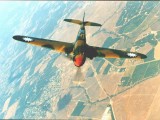
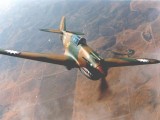
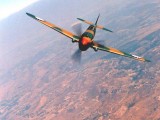
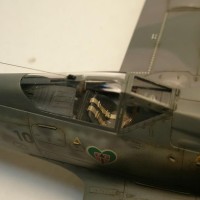
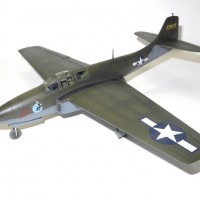
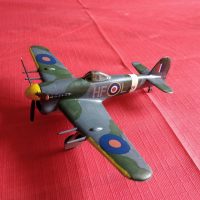
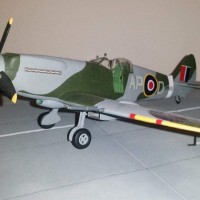
That's a really interesting story that I haven't heard before. Thank you for sharing.
Also, would you have any idea if these a/c went to Soviet Union directly or via the British? And what was the mode of delivery?
They were transported to Murmansk, and according to "history" they were the first 100 British Tomahawks "diverted" to the USSR. How many of them were actually USAAC aircraft no one knows since there was no paperwork.
I'm the historian for the 20th Fighter Wing Association.
First off as a former 77 TFS member (1980-1987) I cringed when you said you didn't have a camera. Oh well such is life.
Though you might find the below interesting. Interesting how Col Eaker thought the birds went to China.
REMARKS BY LT GEN IRA C EAKER, USAF (RET.)
AT 20TH PURSUIT GROUP REUNION, MAY 26, 1962
COLORADO SPRINGS, COLORADO
Introduction
W.A.C. Story
Admiral Story
I should like to do three things now, with brevity and dispatch:
One, express my appreciation General,- Lee for the sound idea for a 20th Pursuit Group Reunion and for the perfect execution of this good plan, Next, I want to recount a few personal memories of my own limited service with the 20th. Finally, I should like to outline a few of my present concerns about our national security.
We all owe our thanks to Bob for originating the idea of a reunion for the 20th and particularly for the perfect plan and sound execution he and his able staff have brought to this operation.
In reading the history of the 20th, I note Bob Lee started out as a 2nd Lieutenant in the 20th. He is a fine example for our cadets today. His career proves that even a 2nd Lieutenant has a chance for future success if he works hard, plays fair and shoots straight. So far as I can see, he has made only one mistake in this whole effort. That lies in giving me the speaker's role tonight. Anyone can be forgiven one mistake. Our present leadership made one when Cuba was invaded without air superiority, There isn't a man here who couldn't have told them that wouldn't work.
In arranging this reunion, Bob Lee shows fine human qualities and an appreciation of history. He must have visioned the pleasure we old timers would get out of this opportunity to meet again and review our experiences of earlier, exciting times. He also shows that he understands the value of looking back from time to time, a feeling for the value of history. I believe it was Saroyan who said, "Those unacquainted with history can be expected to repeat the mistakes of the past."
Bob, I know I express the feelings of all when I --thank you for calling us together again.
When I joined the 20th, in January 1941, 1 was surprised to find something of a country club atmosphere prevailing at that fine station at Hamilton Field. At first I was inclined to be critical. Then I realized no one had told these boys that they would be at war within a year. As a matter of fact, our Congress had just passed a neutrality act. Our leaders were assuring our people that while our sympathies were with Britain and France, we had no intention of sending troops to Europe.
As Executive to General Arnold in the old Munitions Building during 1939 and 1940 1 had been exposed to the briefings by Lindbergh, Colonel Smith. and others who had been privileged to see German air power and who were acquainted with Hitler's plans, and I shared General Arnold's conviction that our joining the war was inevitable. I joined the 20th determined to see that the officers and men of the group were made ready in the
shortest possible time for the cruel, realities they must soon face.
On that first rainy, cold January morning, 1941, 1 went down before daylight to have a look at the Mess. I had an old-fashioned view that one barometer on the state of a military unit was the condition of its Mess. The Mess Hall was a hangar. The food was poor, cold and unappetizing. No officers were present. Next morning all the officers were present. I launched my program, well designed to insure that I was soon to be the most
unpopular Group C.O. the 20th had ever had.
The 20th responded magnificently to my cruelties. I soon found it was composed of good people who only needed a little leadership.
A few months later we were fully equipped, a hundred P-40's., 100 young enthusiastic pilots, all our transportation and support equipment. We had done our flying, night and day, our gunnery, our formation and acrobatics -- we were ready. Then came a cruel blow. A telegram came from General Arnold ordering us to pack up our planes, they were being sent to Chennault and the Flying Tigers in China. I knew what this would do to the morale of the group. So, I called. the officers together, gave them the sad news and concluded by telling them we would pack our planes as quickly as possible, then our 100 pilots and 1,000 men would get into our trucks and do a. practice march up to the Rogue River in Oregon. If they wouldn't let us fly, we would all go fishing. We camped for 10 days at the Elks picnic grounds on the banks of the Rogue near Medford, Oregon. We had two AT-6 trainers left. We flew them 22 hours per day. All our pilots completed their instrument time under the hood. We did out pistol practice and perhaps most important of all, we carried out a strenuous physical fitness program,
I was rather chagrined in the years which followed as I met up with the boys of the 20th all over the world on all the war fronts. They did not say to me, you taught us fly or shoot. They always spoke of that trip to the Rogue and how lean and hard and fit they were when I left them in July of 1942 to go to England as an observer in the Battle of Britain.
I saw the 20th next in the Carolina Maneuvers where under Jesse Auton they gave a good account of themselves. our next meeting was in England in December 1943 when the 20th finally came to the war in Europe. The 20th was delayed in getting to the war because it was repeatedly cut -up to form other groups. I believe the 20th furnished the basic, experienced cadres for six fighter groups in the course of the war, This in itself was a glowing tribute to the 20th. Any farmer will tell you they only use the best ears for the seed corn. This' business of six groups gives me an excuse for telling a story now going the rounds about Khrushchev which also involves the figure six. (The Russian Roulette story -- Khrushchev and. Lumumba).
I left England in January 1944 to go to command the Mediterranean Allied Air Forces, composed of the U.S. 15th and 12th and the British Balkan and Desert Air Forces. This was about the time the 20th began its daring and dramatic onslaught against the Luftwaffe. I did not have a day to day opportunity to observe the outstanding combat record the 20th compiled in the spring and summer of it was with great pride, however, that I learned from time to time that the 20th was among the leaders in all categories and first in many. It was soon called the 'Loco' Group, not because its pilots were crazy, although some would say no doubt that a case could be made for that. it got its name of 'Loco' because of its penchant for destroying locomotives. As many of you well know, the 20th destroyed 400 locomotives and damaged 122, This was important indeed, as transportation was a high priority target in 1944. From December 281 1943 to April 1945, the 20th flew 312 combat missions. it destroyed 432 enemy planes. It produced several of the leading aces of the war.
I am proud indeed of the record of the 20th Pursuit, Group and some of my fondest memories flow from my brief association with that unusual collection of sky warriors. It has been a great personal satisfaction -to note the unusually high number of old 20th pilots who have become general officers.
Now, may I turn briefly to the last item of my trilogy -- my present concerns about national security. In this connection I must tell you that I as strongly today as when I wore the uniform that the soldier or sailor or airman does not lost his citizenship when he puts on the uniform. Since he is willing and often does offer his life for the security of our country, he more than most has a right to express his honest conviction and grave concerns about his country's welfare. This does not mean that he should enter politics or fail to carry out the orders of his superiors without question, It means that it- is his right and duty to- tell our fellow countrymen of the necessities for certain courses of action and the dangers in others, in all legitimate ways and at appropriate times.
Sometimes I fear our people are not cognizant of the first plank in the Communist plan. Khrushchev has said many times that it will not be necessary to fight us. The economic offensive obviously has priority in his plan. The status of our economy, the soundness of the dollar is of equal importance to our military posture.
On the military side, we may be discarding the airplane for the missile and space ship at too fast a rate. Today for the first time in many years we are buying no new type of fighter or bomber. I would push the RS-70 or some equivalent type of supersonic combat plane full out. I would also develop at highest priority a fighter capable of dealing with such a plane in the hands of the enemy.
Next I view with alarm our low priority of defense systems. Defense is to our security what the left hand is to the boxer. It is fair to say that SAC and our other offensive capacity is the right hand of the boxer, but not even Joe Lewis could have won without his left hand. I abhor the view that there is no defense against ICBM's. I am certain that if we put the same concentration, money and effort into the discovery and development of a practical defense against missiles which we put into the Manhattan project for the atom bomb we could find. a solution. A sound defense is a very large part of our deterrent posture. That is why, General Lee, I have a great and continuing interest in your Air Defense Command.
For some time I have felt we are allowing the scientists too great a voice in the selection of our weapons. When the day comes, and there are signs it may be upon us, when military men do not have the decisive voice in the selection of their weapons I can predict our fate, Hitler more than once showed us how to lose wars by interfering with the military in strategy, tactics and weapons.
It has often seemed to me that some of our leaders have forgotten that men still. win or lose wars. I have often likened national security to a three legged milking stool. Its three legs are money, material and men. This stool will not stand without all its three legs. Recently I heard a critic say that some of our Pentagon leaders are almost geniuses in the physical sciences, but they are almost morons in the social sciences; they do not
appear to know how 'to deal successfully with people. This may be too harsh a criticism. But there is evidence that in our weapons making and war planning we have gone overboard on science and have overlooked the importance, in fact the decisive influence of manpower. The sophistication, the unbelievable power and capacity of some of these new weapons make it easy to believe that science is the means and the end of everything, but even this new war world controlled by the computer has not eliminated the need for the man. (Story of the computer which translates Russian) (Carpenter overshot 200 miles)
Lately, along with many thoughtful citizens, I have been worried by the talk of disarmament. I knew of course that if all arms were reduced to those used in the Second World War, Russia's 200 divisions could overrun Europe in a few days; they could be on the English Channel in a few weeks, where England would be at the mercy of their short and medium ranged missiles. I have often wondered why the Russians did not complete
our undoing by agreeing to do away with nuclear weapons. Marshal Malinovsky may have given the answer. Recently I am told one of our visitors to the Kremlin asked Malinovsky his views on disarmament. His reply, translated into Americanese, "Don't be silly, we disarm with 600 million hungry Chinese on our borders!"
I have concluded that we have set up our disarmament agency to study all phases of possible disarmament so that the Russians cannot continue to use disarmament as their exclusive propaganda weapon. Any other view makes disarmament not a valid dream but a cruel hoax. Nations can disarm when the human race has reached a state in evolution when we no longer need policemen in our cities to protect our property and our lives. When there are no longer thieves and murderers among us, the day will be near when nations will no longer attack their neighbors.
I have been much concerned of late about the talk of reserving space for peaceful purposes. If we made such an agreement with Russia, we would keep it and discontinue all experiment ,. test and development of reconnaissance and weapons satellites. The Russians have clearly demonstrated that despite any agreement, they would go full out to develop space weapons capable of delivering 100 megaton bombs at will to any spot on earth. One day then our President would get a telephone call from Khrushchev saying, "That satellite of ours which passes over Washington every hour carries a 100 megaton bomb; I suggest we get together and settle our problems, but first you get your troops out of Europe at once." At that time our President must be able to say, "I have news for you; you did have a satellite which passed over Washington 20 times a day, it may have carried a 100 megaton bomb, but I have just issued orders to intercept and destroy it. I suggest you
check with your scientists. I believe they will confirm that your satellite is missing". The highest priority item on our schedule list today is to maintain SAC, our other offensive forces and our defensive forces of a size and capability adequate to deter enemy attack. Our highest priority for research and development is to provide adequate reconnaissance and weapons satellites by the time they are available to the enemy.
But let us never forget that in the final analysis our security rests on our patriotic, alert, concerned citizens and on the intelligence and courage of our leaders.